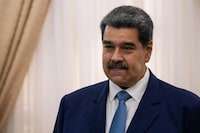The Democrats’ midterm wipeout in Florida — not a single Democrat will hold statewide office next year in what was once a swing state — is bad news for the party but good news for the future of U.S. foreign policy.
Florida is no longer a swing state. That’s good news for U.S. foreign policy.

The Florida factor helps to explain why President Donald Trump rolled back Barack Obama’s attempts to normalize relations with Cuba and tightened sanctions on Venezuela beginning in 2017. After a fraudulent election in Venezuela in 2018, the Trump administration recognized opposition leader Juan Guaidó as president and tried to foment an uprising against the regime of Nicolás Maduro. Neither approach has achieved U.S. foreign policy objectives, but they accomplished what Trump wanted: He won nearly 70 percent of Cuban American votes in Florida in 2020.
In part because of the political risks involved, Biden has been slow to roll back Trump’s “maximum pressure” campaigns against Cuba and Venezuela. He waited until this May, after more than a year in office, to relax some sanctions on Cuba. But he stopped short of returning to Obama’s 2014 policy of normalizing relations and has maintained Trump’s ludicrous designation of Cuba as a state sponsor of terrorism despite the consensus within the U.S. intelligence community that is not actually sponsoring any terrorism. Biden has been even slower to dial back Trump’s failed approach to Venezuela.
Follow Max Boot‘s opinions
Follow“Biden’s political advisers were so petrified of Cuban American and Venezuelan American voters in south Florida that for two years they left in place Donald Trump’s failed policy of regime change toward Cuba and Venezuela, despite the humanitarian disasters it caused — and in the end, it gained them nothing,” William LeoGrande, a specialist in Latin American politics at American University, told me. His article in Foreign Policy this month expressed the hope that the Democratic defeat in Florida would finally break “the habit of letting domestic politics drive Cuba policy.”
Now that the midterms are over, the administration is finally taking some small, belated steps in a new direction.
On Saturday, the White House granted permission to Chevron to begin pumping oil again in Venezuela, with the profits going to pay that country’s creditors. This comes after the Venezuelan government met for the first time in a year with opposition representatives in Mexico City on Saturday, and the two sides vowed to resume discussions on holding elections in 2024. An administration official told me that further relaxation of sanctions will occur if Venezuela makes more progress on human rights.
That is the right policy to follow, because it has long been clear that U.S. pressure wasn’t going to overthrow the Maduro regime — any more than it has overthrown the Castro-created regime in Cuba despite a U.S. trade embargo that has now lasted more than 60 years.
LeoGrande told me the current situation reminds him of Nicaragua in the late 1980s. Reagan administration attempts to overthrow the Sandinista regime by backing the contra rebels had failed, but Washington still retained considerable leverage because the Sandinistas wanted to see U.S. sanctions lifted. A regional peace process resulted in the end of the war, the lifting of sanctions and the holding of internationally supervised elections in 1990 that the Sandinistas lost. “I think Biden is trying to find a similar formula in Venezuela,” LeoGrande told me.
That formula, admittedly, might not exist; Maduro may not be willing to hold a fair election even if it will result in the lifting of sanctions. But what have we got to lose? The current policy has worsened life for ordinary Venezuelans (76 percent live in “extreme poverty”) and exacerbated the immigration crisis in the United States (more than 150,000 Venezuelans have arrived at the southern border this year). But U.S. pressure hasn’t shaken Maduro’s hold on power.
It’s time for a different approach, without having to worry about the impact on Florida politics. The same is true in Cuba: There is no good reason not to normalize relations with Havana and lift the terrorism designation.
Rolling back sanctions should not be seen as Biden’s endorsement of “brutal socialist” regimes, as Republicans will charge. We can maintain relations with repressive regimes such as Bahrain, Egypt, Turkey and Saudi Arabia, even while pressing them on human rights. Sanctions are sometimes necessary — they help to constrain the militaries in Iran, Russia and North Korea — but they almost never result in regime change or even human rights improvements. North Korea, after all, is one of the most heavily sanctioned countries on the planet and also one of the most Stalinist.
I’m all for prioritizing human rights in foreign policy, but we need to do so in ways that make a difference rather than engaging in symbolic, self-defeating gestures designed for domestic political advantage. The Democratic rout in Florida finally makes more rational policymaking possible toward Cuba and Venezuela.






